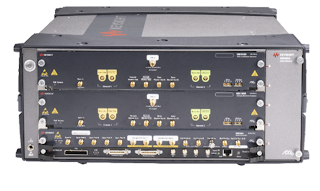Keysight Technologies introduced its M8199B arbitrary waveform generator (AWG), which provides R&D engineers a high-performance signal source for arbitrary signals that enables development of designs employing multi-level modulation formats (e.g. 64QAM) at well beyond 160 GBaud.
Applications beyond 128 GBaud demand a new class of generators that provide high speed, precision and flexibility at the same time. Keysight addressed these challenges with the company’s new M8199B AWG which offers a high performing signal source for arbitrary signals with sampling rate up to 256 GSa/s and analog bandwidth exceeding 80 GHz, including up to eight synchronized channels operating simultaneously.
Keysight’s new M8199B AWG provides research engineers the speed, bandwidth, precision, and flexibility to meet the challenges of next-generation applications, enabling data transmission greater than 400 Gbps per lane in intensity-modulation/direct-detect (IM/DD) and greater than 1.6 Tbps per carrier in coherent optical communications.
"Today’s applications and services generate vast amounts of artificial intelligence workloads in the data center. New electrical and optical designs are required to handle these workloads within reasonable bounds of energy consumption," said Dr. Joachim Peerlings, vice president and general manager of Keysight's Network and Data Center business. "We are pleased with Keysight's continuous efforts to deliver first-to-market solutions that support our customers to connect and sustain our planet and take the next step in the race for higher data transmission rates."
Highlights for the M8199B AWG:
- Intensity-Modulation/Direct-Detect (IM/DD) and coherent optical applications: provides the flexibility needed for advanced research on new modulation formats to boost transmission rates to the next level. The M8199B AWG matches with high-speed research experimenting using multi-level pulse-amplitude modulation (PAM), quadrature-amplitude modulation (QAM) formats and other proprietary modulation formats at symbol rates approaching 200 GBaud. In addition, it provides stress signals to test next generation electro/optical components, digital signal processor application-specific integrated circuits (DSP-ASICs), and new algorithm concepts for multi-terabit transmissions systems.
- Wideband radio frequency (RF) signal generation in wireless and aerospace/defense applications: addresses the latest developments in radar and wireless technologies which require generation of high-quality signals with modulation bandwidths well beyond 10 GHz. Generating those signals on an intermediate frequency (IF) rather than on quadrature signals is another important capability to support these applications.
- Physics, chemistry, and general-purpose electronics research: enables users to generate any arbitrary waveform that can be mathematically described, including ultra-short pulses, wideband RF pulses, and chirps needed to investigate in applications such as chemical reactions, elementary particle excitation and quantum effects.













